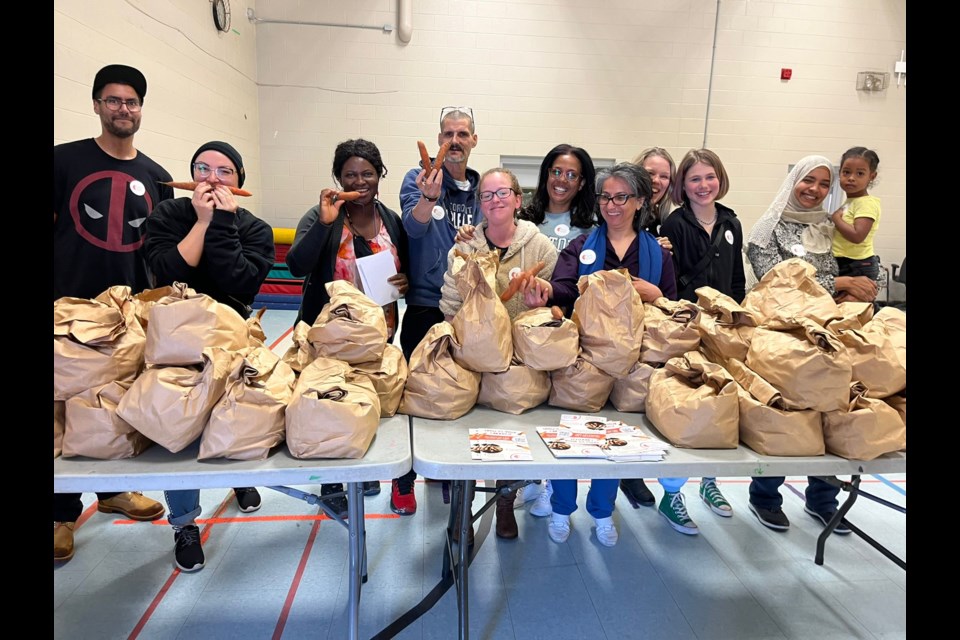Food Uniting Neighbours (F.U.N.), a food access pilot project in the Onward Willow area that has been underway for a year, is hosting its first Community Cafe event.
The event will be catered by Food Equity With Dignity (FEWD). The cafe gives community members opportunities for a social space to get together, eat and talk with people in the neighbourhood. It will be hosted on May 11 from 12 to 3 p.m. at the Shelldale Centre.
“Just trying to get people connected again, especially coming out of COVID when people have been so isolated,” said Dana Nuttley, community advisor for F.U.N.
“We’re always trying to engage with the community,” said Zera Koutchieva, community advisor for F.U.N.
F.U.N. is one of the projects to come out of Our Food Future.
Our Food Future, is an initiative which aims to implement a circular food economy in Guelph-Wellington. It was awarded $10 million through Infrastructure Canada’s Smart Cities Challenge.
The F.U.N. pilot project has 13 community advisors making the project come to life. “We’re not the only voices,” said Koutchieva.
“So when we think of ideas they want to make sure they’re inclusive and that everyone can participate,” said Jess Haines, U of G professor and lead researcher for F.U.N.
One of the misconceptions about Onward Willow residents is that people think we don’t need as much of a sense of dignity as everyone else but we really do, Koutchieva said.
“The feedback from the community was loud and clear. Everybody said that when accessing food services they want to feel like they are treated with dignity and they matter as much as someone going to Market Fresh,” she said.
One of the barriers to food access in Onward Willow the community advisors of F.U.N. identified is transportation.
Taxis are expensive, said Nuttley.
“One of the things we heard was that ‘I can only buy as much as I can carry on my back,’” said Nayssam Shujauddin, community lead at 10C and F.U.N.
This means multiple grocery trips and trying to find rides to get there, she said.
A solution F.U.N. is working on is testing and purchasing grocery trolleys to make grocery trips a bit easier.
F.U.N. conducted focus groups with 87 participants to identify areas and barriers to work on. Five major themes were identified as actionable solutions; transportation, connection, education, grocery gift cards and gardening.
The hope for the project is to make it sustainable and adaptable for other neighbourhoods while realizing that every neighbourhood has different needs, said Shujauddin.
The aim of the project is “to tackle food insecurity in the Onward Willow Neighbourhood,” said Nuttley. “Improving access and food security in a way that is defined by the neighbourhood,” said Shujauddin.
“If we can get more community involved we can make this sustainable,” he said.
The University of Guelph plays a role in the pilot project by gathering information and research.
“The beauty of it is that we do have this research element to it,” said Shujauddin.
“This is a need and this is really important and there is a lot of good that comes out of piloting all of these different actions that we do,” she said.
Everything they learn from the first two years of the project can be used to apply for more funding down the line.
The U of G received $764,000 in funding for the project from the federal government’s Public Health Agency of Canada’s Healthy Canadians and Communities Fund. The purpose is to distribute the funds to projects that are trying to reduce chronic disease among Canadians by mitigating risk factors.
The funding allows the community advisors to be paid a living wage, said Haines. The funds are also used to “make the actions they come up with, come to life,” like the Community Cafe, she said.
“I think people have felt heard,” said Shujauddin. The community advisors are feeling hopeful and excited “about something they are leading the charge on,” she said.
“What the community brings to the table of course is lived experience and an understanding of the community,” said Haines. These are things researchers don’t have, she said.
The research will measure the success of the project, if they got as many people involved as they hoped to and to see if community members liked it, Haines said.
After the project is evaluated it will show who the project helped with the different barriers it identified.
Part of the work is identifying other food access community partners and how they can be embedded into the project, said Haines.
Koutchieva is a single mother and her son has complex special needs. What she brings to the table is the importance of the relationship between mental health and food disparity, she said.
“I saw that in my own community there’s a ton of people who struggle not necessarily because they can’t get to the food bank or can’t go to the grocery store but because they can’t leave the house,” said Koutchieva.
They are going through depression, anxiety and a plethora of other mental health challenges, she said.
Anything to give people the tools and accessibility to get nutritious foods are her hopes of what she can help achieve with this pilot project.
